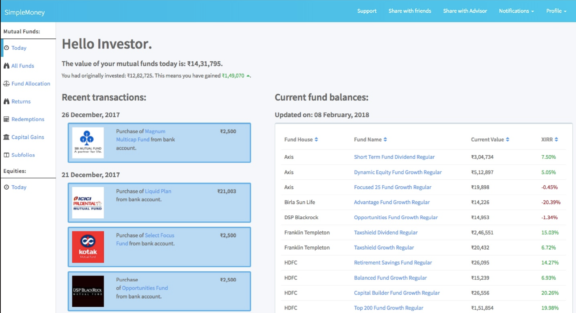Gold is always a very attractive investment for Indian households. India is the biggest consumer of world’s gold. India imports significant amount of gold every year. During the festive season and wedding, rate of buying gold increases. Recently gold price has been appreciated significantly. Investors can invest in gold in many ways such as Physical gold, Gold ETFs, Mutual Fund etc. each of having its own benefits. Here we will discuss about various Gold investment options in India and what should you choose for investment.
Physical Gold:
Physical Gold is the most conventional way to invest in gold. We buy Gold jewelry for our personal use. In difficult time we mortgage them and lend money from NBFCs. Sometimes people sell their jewelry in distressed time and buy again when they regain their financial status.
People buy gold coins and bars for investments or future use. Gold coins and bars are available in different weights such as 5, 10, 20 gms. Gold coins and bars are of 24 carat purity. All coins and bars are hallmarked as per BIS standards. The gold coins can be brought from MMTC outlets, designated bank branches and post offices.
There are many gold savings scheme run by jewelers. You have to deposit a fixed amount every month in this scheme and after all complete all deposits you can buy jewelry from the deposited amount. The shop often gives you one installment extra as a reward.
The gold jewelry is having making charges and GST on making charges which makes investment on physical gold as less attractive.
Gold ETF:
You can own paper Gold through buying of ETFs. The Gold ETFs are traded in the stock exchange. These ETFs price is varied according to the Gold price as the underlying asset for this ETF is Gold. You need to have a Demat and Trading account to buy and sell the Gold ETFs.
Read More: Best Demat and Trading Account for beginners.
The investors can buy as per their need or may buy systematically every month as SIP who wants to accumulate gold for future use over a long period of time. You can even buy 1 gm of gold through ETFs.
Gold Mutual Fund:
If you don’t have a Demat and Trading account you can buy gold through mutual fund also. All leading Mutual fund houses are having gold funds. These funds are set gold ETF prices as the benchmark of their performance. As the Gold ETF prices are changing the NAV of the fund changes. Fund management charges are very less (<1.5%) for gold mutual funds.
The gold investments through ETFs and Mutual Funds are attractive due to its less cost, transparency in pricing and easy to investment. Moreover there is no requirement of storage and associated locker costs. You can easily liquidate your savings at any time. The money will come to your bank account within 3 days.
The Gold ETFs or Mutual Funds are taxed similar to the physical gold. If you hold the Gold investments for more than 3 years it is termed as long term capital gain and taxed at 20% with indexation benefits. If the holding is for less than 3 years the tax will be at the income tax slab.
Read More: How to calculate Capital Gain Tax
Digital Gold:
You can invest in Gold coins and bars digitally. They are offered via platforms like Paytm, Google Pay, Phone Pe, Kuvera etc. The popularity of these platforms helps to reach the customers and invest in Gold. In this option you can buy gold in fraction of weight of any denomination. The investor can take the delivery of physical gold also.
There are some disadvantages to invest in physical gold:
There is no regulator for physical gold unlike SEBI and RBI for Gold ETFs and Sovereign Gold Bonds.
Even if you buy Digital Gold you have to pay 3% GST similar to physical Gold. If you buy Digital Gold of Rs 1000 you will get gold worth Rs 970 as Rs 30 goes as GST.
There is a significant amount of spread (Difference between buy and Sell) ranges between 2-3% which provides the expense such as storage cost, insurance cost and trustee fee.
Sovereign Gold Bond Scheme:
The sovereign Gold Bonds is another investment option by which you can invest into the gold. This scheme is linked with gold price. It is also traded in the stock exchange which helps regular and easy trading of gold. It will also restrict the importing of gold from foreign countries in lieu of dollars. The bonds are issued by Reserve Bank of India on behalf of Government of India.
There are various benefits of investing in SGBs
- The minimum investment is started from 1 gram of gold.
- The gold bonds can be hold either in Demat account or in paper form.
- Bonds are of eight years tenure. However, you can exit at 5th, 6th and 7th year of tenure.
- Moreover, it can be traded in the stock exchanges. Those are having Demat and trading accounts can easily exit by selling in the stock exchanges.
- An interest of 2.5% per annum will be given per gram of gold payable half yearly. This interest is over and above the appreciated value of gold. This regular income is a significant advantageous than the physical or gold ETF.
- Bonds can be used as loan security like physical gold.
- If you redeem the gold bond, the capital gain tax is exempted. If the bond has been transferred, long term capital gain tax to be calculated considering the indexation benefit.
- On top of that you don’t have a risk of theft or loss of physical gold.
- The bonds are in denomination of 1, 2, 5, 10, 50, 100 grams of gold or other denominations.
- Part holdings can be redeemed in multiples of one gm.
Disadvantages of SGB:
This is very good product who are interested in investing in the gold. This scheme does not have too many disadvantages except that investing on maximum 500 gms of gold per year. The investment on gold of 500 gms per year is also on a very high side for a retail investor. This bond is for resident Indians. So the Non-resident Indians cannot invest in this gold bond.
Sovereign Gold Bonds Scheme & Tax Implications
- If you redeem bonds within 36 months (3 years), you have to pay tax on STCG (Short Term Capital gains) which is as per your Income Tax slab i.e. 0 to 30%.
- Long term capital gains to any bond holder on sale or transfer of SGB is taxable and he or she is eligible for indexation benefits. The LTCG is taxed at 20% with indexation.
- Gold bonds will be exempted from capital gains (LTCG) tax at the time of redemption. So, if you hold the bonds for at least five years and if you make any long term capital gains when redeeming your gold bonds, there will be no capital gain taxes.
Comparison between Gold Investment Options
| Physical Gold | Gold ETF | Gold Funds | Digital Gold | Gold Bonds | |
| Purity | Depends on Jeweler | High | High | High | High |
| Investment Limit | No Limit | 1 Unit min | Rs 1000 min | No | 1 gm Min/4 kg max |
| Storage Cost | High (if Locker is used) | Low | Low | High | Low |
| Collateral for Loan | Yes | No | No | Yes | Yes |
| Liquidity | Can be Sold to jeweler at any time | Very liquid | Can be redeemed at any time | Can sell. But sell price is low due to high spread | Tradable on exchange. Can be redeemed after 5 years. |
| Return | Lower than actual | Almost same as actual as very less expense char | Almost same as actual as very less expense char | Lower than actual as expense is high | More than actual as there is 2.5% extra return per annum |
Where Should You Invest?
As we have checked the Gold Investment options the advantages and disadvantages are clear. Physical gold is good if you use the gold as jewelry. The use of gold and buying them is kind of passive investment. You buy the gold primarily for use. Gold ETF is very good options to invest. Those are easy to keep and there is no storage cost. Moreover very less expense for Gold ETFs.
Digital Gold through online platforms has high spread which is an immediate loss to the customer when they sell the gold. In my opinion, you should invest in the gold bonds scheme as it offers capital appreciation as well as 2.5% interest whereas GOLD ETF offers only capital appreciation.
To maintain, physical gold you have to spend some money, but in case of gold bond there is no maintenance charge. But the gold bonds are not very liquid in the stock market but Gold ETFs are liquid enough and traded well. Hence if you want liquidity invest in Gold ETF. If you are a retail investor and invest some portion of your portfolio in Gold can invest the Gold Bond systematically as it also attracts 2.5% extra return per annum.
Share the article. 🙂



